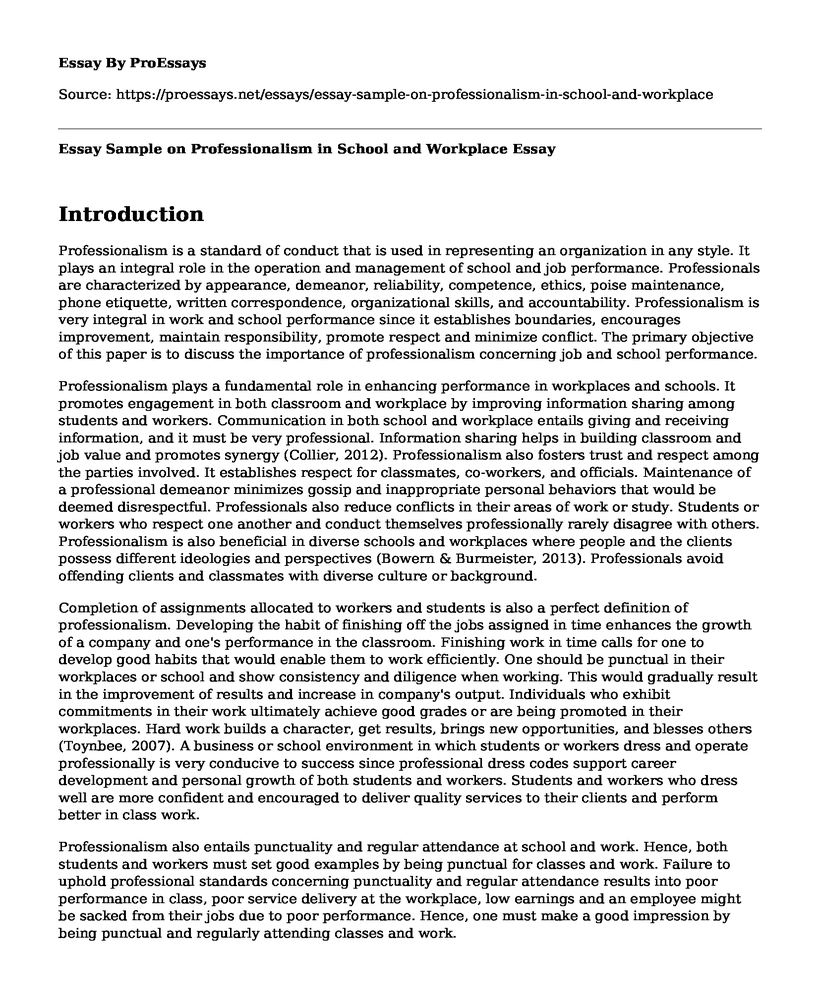Introduction
Professionalism is a standard of conduct that is used in representing an organization in any style. It plays an integral role in the operation and management of school and job performance. Professionals are characterized by appearance, demeanor, reliability, competence, ethics, poise maintenance, phone etiquette, written correspondence, organizational skills, and accountability. Professionalism is very integral in work and school performance since it establishes boundaries, encourages improvement, maintain responsibility, promote respect and minimize conflict. The primary objective of this paper is to discuss the importance of professionalism concerning job and school performance.
Professionalism plays a fundamental role in enhancing performance in workplaces and schools. It promotes engagement in both classroom and workplace by improving information sharing among students and workers. Communication in both school and workplace entails giving and receiving information, and it must be very professional. Information sharing helps in building classroom and job value and promotes synergy (Collier, 2012). Professionalism also fosters trust and respect among the parties involved. It establishes respect for classmates, co-workers, and officials. Maintenance of a professional demeanor minimizes gossip and inappropriate personal behaviors that would be deemed disrespectful. Professionals also reduce conflicts in their areas of work or study. Students or workers who respect one another and conduct themselves professionally rarely disagree with others. Professionalism is also beneficial in diverse schools and workplaces where people and the clients possess different ideologies and perspectives (Bowern & Burmeister, 2013). Professionals avoid offending clients and classmates with diverse culture or background.
Completion of assignments allocated to workers and students is also a perfect definition of professionalism. Developing the habit of finishing off the jobs assigned in time enhances the growth of a company and one's performance in the classroom. Finishing work in time calls for one to develop good habits that would enable them to work efficiently. One should be punctual in their workplaces or school and show consistency and diligence when working. This would gradually result in the improvement of results and increase in company's output. Individuals who exhibit commitments in their work ultimately achieve good grades or are being promoted in their workplaces. Hard work builds a character, get results, brings new opportunities, and blesses others (Toynbee, 2007). A business or school environment in which students or workers dress and operate professionally is very conducive to success since professional dress codes support career development and personal growth of both students and workers. Students and workers who dress well are more confident and encouraged to deliver quality services to their clients and perform better in class work.
Professionalism also entails punctuality and regular attendance at school and work. Hence, both students and workers must set good examples by being punctual for classes and work. Failure to uphold professional standards concerning punctuality and regular attendance results into poor performance in class, poor service delivery at the workplace, low earnings and an employee might be sacked from their jobs due to poor performance. Hence, one must make a good impression by being punctual and regularly attending classes and work.
Conclusion
Professionalism is also displayed in teamwork in both classroom and workplace. Cooperation entails a commitment to other people who are members of one's group. For one to work efficiently with others in a group, they must establish boundaries and maintain accountability. Students and workers in groups develop boundaries between standard professional behaviors and unethical behaviors. Responsibility in a group is also manifested in the way workers cooperate and provide written information to clients. These documents help companies to be accountable for the services that they provide.
References
Bowern, M., & Burmeister, O. K. (2013). Business benefits from keeping codes of ethics up to date. Professionalism in the Information and Communication Technology Industry. doi:10.22459/picti.10.2013.14
Collier, R. (2012). Professionalism: The importance of trust. Canadian Medical Association Journal, 184(13), 1455-1456. doi:10.1503/cmaj.109-4264
Toynbee, P. (2007). Rethinking humanity in care work - extract from Hard work: Life in Low-pay Britain. Searching for the human in human resource management, 219-243. doi:10.1007/978-1-137-02023-9_12
Cite this page
Essay Sample on Professionalism in School and Workplace. (2022, Apr 14). Retrieved from https://proessays.net/essays/essay-sample-on-professionalism-in-school-and-workplace
If you are the original author of this essay and no longer wish to have it published on the ProEssays website, please click below to request its removal:
- World View Interview Reflection
- Changing Student Behavior Paper Example
- Identification of Pupil Mental Health Issues Paper Example
- The Failure of FDA of Rofecoxib Case Study Paper Example
- Essay on Jose Mourinho: A Journey From School Manager to Soccer Coach
- Annotated Bibliography Example on Schools Evolving: Adapting to the Changing Workplace Environment
- Free Essay Example on 4 Planning Styles: Conflict & Compatibility







